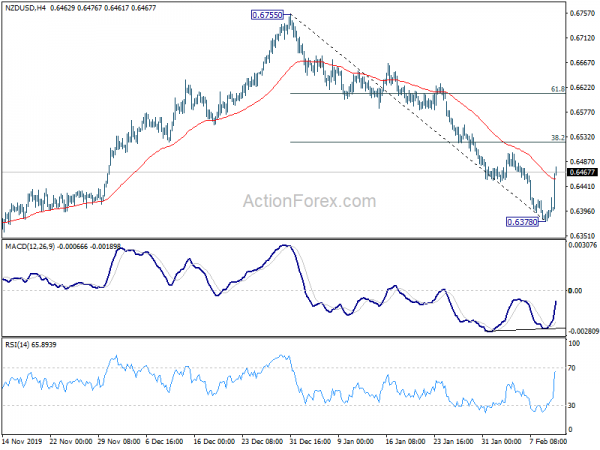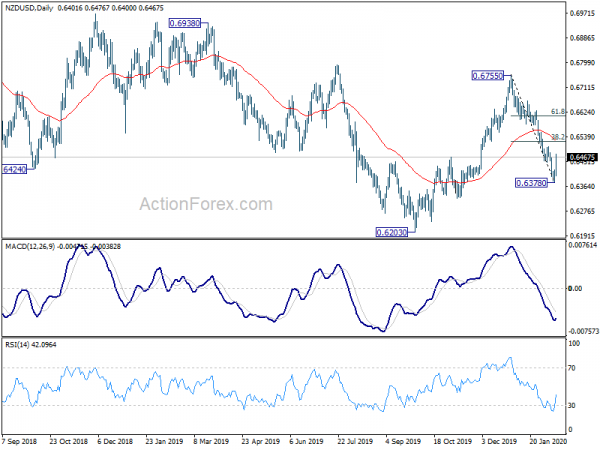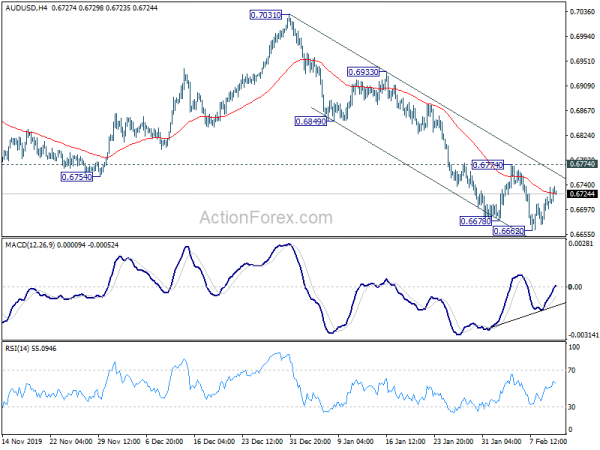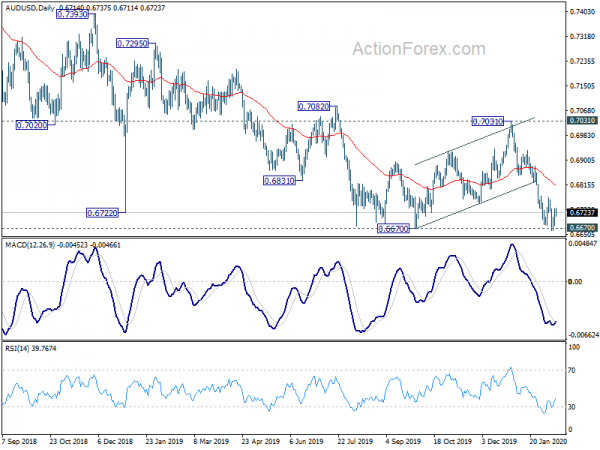New Zealand Dollar surges broadly today after RBNZ’s hawkish hold. Other commodity currencies follow as risk appetite returns to the markets, on hope that China’s coronavirus outbreak would peak soon. US stock indices also hit new records after Fed Chair Jerome Powell’s affirmative comments. While Dollar turns softer, there is no clear support seen in Euro, which is trading as the weakest for today for now.
Technically, EUR/USD is still on track to retest 1.0879 low, but it’s starting to lose downside momentum. The greenback also turned softer all other major pairs. Focus is indeed back on 0.9740 minor support in USD/CHF, 1.3262 minor support in USD/CAD and 0.6774 minor resistance in AUD/USD. Break of these levels will indicate short term topping in the green back and could help lift EUR/USD for a recovery.
In Asia, Nikkei closed up 0.74%. Hong Kong HSI is up 0.97%. China Shanghai SSE is up 0.71%. Singapore Strait Times is up 1.34%. Japan 10-year JGB yield is up 0.0174 at -0.039. Overnight, DOW dropped -0.00%. S&P 500 rose 0.17%. NASDAQ rose 0.11%. 10-year year rose 0.043 to 1.590.
NZD rebounds after RBNZ’s hawkish hold
RBNZ left the Official Cash Rate unchanged at 1.00% as widely expected. In the accompanying statement, its noted “soft momentum” has continued in 2020″. But “growth is expected to accelerate over the second half of 2020 driven by monetary and fiscal stimulus, and the high terms of trade.” Impact of outbreak of China’s coronavirus will be “of a short duration” only.
The statement is seen as slightly more hawkish than November’s. Employment is seen by RBNZ as “at or slightly above its maximum sustainable level”, somewhat upgraded from “around” the level. Consumer inflation is “close to” the 2% mid-point of target range too. While low interest remain necessary, the overall statement suggests that RBNZ is more likely to be on hold for the rest of the year than not.
Suggested readings on RBNZ:
NZD/USD rebounds strongly after the release. The development suggest short term bottoming a 0.6378, on bullish convergence condition in 4 hour MACD. Stronger recovery would be seen to 38.2% retracement of 0.6755 to 0.6378 at 0.6522. That would be close to 55 day EMA (now at 0.6528). We’d expect strong resistance from there to limit upside, at least on first attempt. For now, fall from from 0.6755 is expected resume later after consolidation from 0.6378 finishes.


China’s coronavirus death rose to 1113, US warns of supply chain disruption
According to China’s National Health Commission, on February 11, there were 2015 new confirmed coronavirus cases, bringing the accumulated total to 44653. Death tolls increased 97 to 1113. There are currently 8204 serious cases, 16067 suspected cases and 451462 people tracked.
US White House national security adviser Robert O’Brien warned “there’s no doubt that the virus could have an impact on the US economy and also on the world economy”. The coronavirus could have disruptive impact on the global supply chain, and “We’ll have to wait and see how it plays out and whether alternate suppliers can be found.”
O’Brien also noted, “we expect the Phase 1 deal will allow China to import more food and open those markets to American farmers, but certainly as we watch this coronavirus outbreak unfold in China it could have an impact on how big, at least in this current year, the purchases are.”
IMF: Coronavirus poses large downsides risks for countries with close ties with China
IMF Director of Asia and Pacific, Changyong Rhee, said that if coronavirus slows the Chinese economy, the government has “policy room” for stimulus. Nevertheless, he insisted that China should continue with “structural reform and credit control”. He added that “(We) don’t want to deny this event definitely increases the downside risk. Especially the downside risk will be large for countries which have close ties with China. At this moment, I think a major channel that has an impact in Asia is tourism”.
In China, Cai Fang, the vice head of the Chinese Academy of Social Sciences (CASS), said “although the temporary impact caused by the epidemic will slightly reduce the growth rate and other development indicators, it will not delay the fulfillment of the goal of building a moderately prosperous society.” He added that the government should use policy tools in a timely and flexible way and adopt “unconventional policy tools”, to support the economy.
Fed Powell: Current low interest rate means fiscal policy needed if economy weakens
In the Semiannual Monetary Policy Report to the Congress, Fed Chair Jerome Powell warned that while “some of the uncertainties around trade have diminished recently, but risks to the outlook remain. In particular, Fed is ” closely monitoring the emergence of the coronavirus, which could lead to disruptions in China that spill over to the rest of the global economy.”
But for now, he said, the “current stance of monetary policy will likely remain appropriate”, if incoming information about the economic remains broadly consistent with FOMC’s outlook. He also reiterated that ” If developments emerge that cause a material reassessment of our outlook, we would respond accordingly.”
Powell also pointed out that the current low interest rate environment means “it would be important for fiscal policy to help support the economy if it weakens”. He added, “Putting the federal budget on a sustainable path when the economy is strong would help ensure that policymakers have the space to use fiscal policy to assist in stabilizing the economy during a downturn. A more sustainable federal budget could also support the economy’s growth over the long term.”
Elsewhere
Japan M2 rose 2.8% yoy in January, above expectation of 2.6% yoy. Machine tool orders dropped -35.6% yoy in January. Australia Westpac consumer confidence rose 2.3% in February. Eurozone will release industrial production today. Fed Chair Powell will have second part of his semi annual testimony.
AUD/USD Daily Report
Daily Pivots: (S1) 0.6685; (P) 0.6711; (R1) 0.6740; More….
AUD/USD’s recovery from 0.6662 extends higher today but stays below 0.6774 resistance so far. Intraday bias remains neutral and further decline is expected. On the downside, decisive break of 0.6670 low would confirm larger down trend resumption. However, on the upside, break of 0.6774 resistance will indicate short term bottoming and bring stronger rebound.
In the bigger picture, AUD/USD’s decline from 0.8135 (2018 high) is still in progress. It’s part of the larger down trend from 1.1079 (2011 high). Rejection by 55 week EMA affirms medium term bearishness. Next target is 0.6008 (2008 low). Outlook will stay bearish as long as 0.7031 resistance holds, even in case of strong rebound.
Economic Indicators Update
| GMT | Ccy | Events | Actual | Forecast | Previous | Revised |
|---|---|---|---|---|---|---|
| 23:30 | AUD | Westpac Consumer Confidence Feb | 2.30% | -1.80% | ||
| 23:50 | JPY | Money Supply M2+CD Y/Y Jan | 2.80% | 2.60% | 2.70% | |
| 1:00 | NZD | RBNZ Interest Rate Decision | 1.00% | 1.00% | 1.00% | |
| 2:00 | NZD | RBNZ Press Conference | ||||
| 6:00 | JPY | Machine Tool Orders Y/Y Jan P | -35.60% | -33.60% | -33.50% | |
| 10:00 | EUR | Eurozone Industrial Production M/M Dec | -0.40% | 0.20% | ||
| 15:00 | USD | Fed Chair Powell Testifies | ||||
| 15:30 | USD | Crude Oil Inventories | 3.4M |




 Signal2forex.com - Best Forex robots and signals
Signal2forex.com - Best Forex robots and signals




